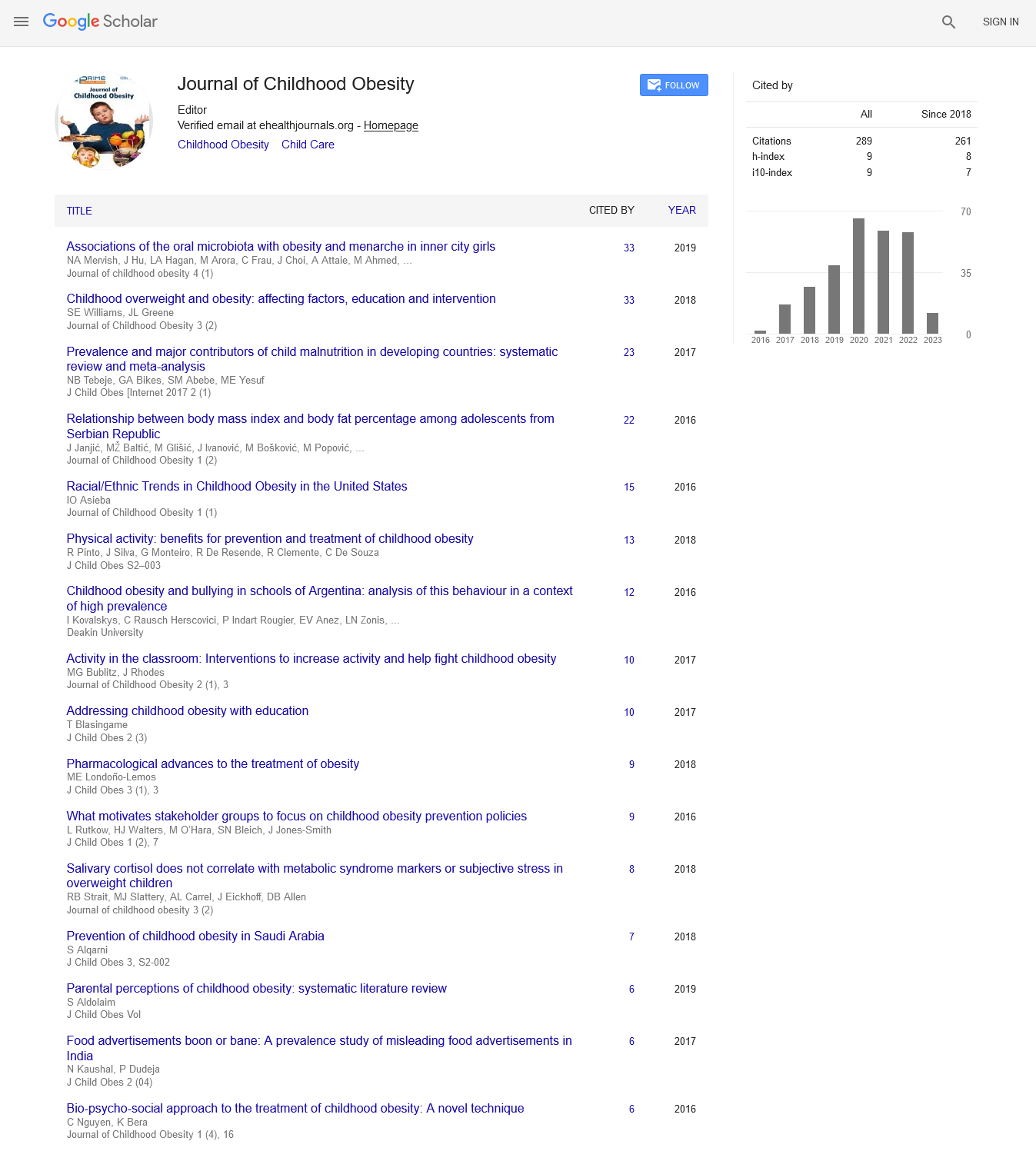Commentary - (2023) Volume 8, Issue 6
Tackling the Epidemic Pediatrics Obesity in Children
Maria Martinez*
Department of Health Sciences, Baylor University, United States of America
*Correspondence:
Maria Martinez,
Department of Health Sciences, Baylor University,
United States of America,
Email:
Received: 29-Nov-2023, Manuscript No. ipjco-24-18884;
Editor assigned: 01-Dec-2023, Pre QC No. ipjco-24-18884 (PQ);
Reviewed: 15-Dec-2023, QC No. ipjco-24-18884;
Revised: 20-Dec-2023, Manuscript No. ipjco-24-18884 (R);
Published:
27-Dec-2023, DOI: 10.21767/2572-5394-23.8.58
Description
Pediatric obesity has emerged as a critical public health issue,
affecting millions of children worldwide. The prevalence of
childhood obesity has risen significantly over the past few
decades, raising concerns about its immediate and longterm
health implications. In this article, we delve into the
multifaceted aspects of pediatric obesity, exploring its causes,
health risks, and the imperative need for preventive strategies
and intervention. Pediatric obesity is a complex condition with
various contributing factors. While genetics can play a role,
environmental and lifestyle factors are often significant drivers.
Here are key contributors to pediatric obesity. Diets high in
processed foods, sugary beverages, and fast food contribute
to excess calorie intake and poor nutrition. Lack of access to
nutritious foods and an overreliance on convenience foods
can be detrimental to a child’s health. Sedentary behaviors,
including excessive screen time and a lack of regular physical
activity, are associated with pediatric obesity. A decline in
outdoor play and increased time spent on electronic devices
contribute to a more sedentary lifestyle. Family habits and the
home environment can significantly impact a child’s weight.
Behaviors learned at home, including dietary choices and
activity levels, play a crucial role in shaping a child’s lifestyle.
Children from lower socioeconomic backgrounds may face
challenges such as limited access to healthy food options,
fewer opportunities for recreational activities, and a higher
prevalence of food insecurity, all of which contribute to the risk
of obesity. Pediatric obesity is not just a matter of appearance;
it poses immediate and long-term health risks that can affect
a child’s well-being throughout their life. Some of the health
risks associated with pediatric obesity include rise in pediatric
obesity has led to an increased incidence of type 2 diabetes in
children. Insulin resistance, a hallmark of type 2 diabetes, is
exacerbated by excess body weight. Pediatric obesity is linked
to an increased risk of high blood pressure, high cholesterol
levels, and other cardiovascular problems. These factors, when
present in childhood, contribute to the early development
of heart disease. Excess weight places additional stress on a
child’s musculoskeletal system, leading to orthopedic issues
such as joint pain and increased risk of fractures. Pediatric
obesity can have profound effects on a child’s mental health,
leading to issues such as low self-esteem, depression, anxiety,
and social isolation. These psychological challenges can
persist into adulthood. Addressing pediatric obesity requires
a comprehensive approach involving individuals, families,
healthcare professionals, schools, and communities. Here
are key strategies for prevention and intervention Promoting
nutrition education for parents and children is crucial.
Encouraging a balanced diet that includes fruits, vegetables,
whole grains, and lean proteins helps establish healthy eating
habits. Emphasizing the importance of regular physical activity
is essential. Schools, communities, and families should provide
opportunities for children to engage in age-appropriate
physical activities. Creating environments that support healthy
living is vital. This includes ensuring access to nutritious foods,
safe spaces for physical activity, and policies that promote
a health-conscious culture. Involving the entire family in
adopting healthy habits enhances the likelihood of success.
Family-based interventions that focus on lifestyle changes,
including meal planning and increased physical activity, can be
effective. Routine health check-ups should include screenings
for obesity-related risk factors, allowing for early detection and
intervention.
Acknowledgement
None.
Conflict Of Interest
The author declares there is no conflict of interest in publishing
this article.
Citation: Martinez M (2023) Nurturing Well-being Comprehensive Approach to Weight Management in Children. J Child Obesity. 8:58.
Copyright: © 2023 Martinez M. This is an open-access article distributed under the terms of the Creative Commons Attribution License, which permits unrestricted use, distribution, and reproduction in any medium, provided the original author and source are credited.

